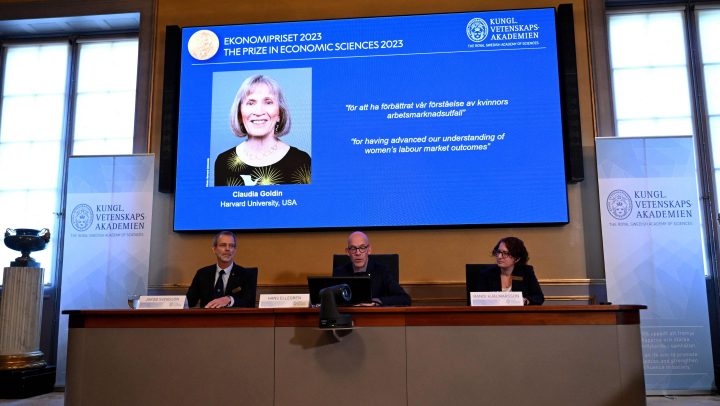
Economic historian Claudia Goldin wins Nobel Prize in economics for research on gender pay gap
Economic historian Claudia Goldin wins Nobel Prize in economics for research on gender pay gap

This morning, it was announced that Claudia Goldin won the 2023 Nobel Prize in economics. Currently the Henry Lee Professor of Economics at Harvard University and a co-director of the National Bureau of Economic Research’s Gender in the Economy group, she served as the director of the NBER’s Development of the American Economy program for nearly three decades.
Goldin is an economic historian and labor economist whose work revolutionized the study of why women get paid less than men.
“Thanks to Claudia Goldin’s groundbreaking research, we now know much more about the underlying factors and which barriers may need to be addressed,” said the chair of the Prize committee. Goldin is the third woman to receive the award.
Senior economics contributor Chris Farrell joined “Marketplace Morning Report” host David Brancaccio to discuss Goldin’s work and its impact.
Chris Farrell: You know, I have to tell you, David, I’ve interviewed [Goldin] over the years and she is one of those professors that is very thoughtful, gives you very clear answers. And by the way, I can recommend anybody, you can read her speeches go to her website — her talks, they’re wonderful. And what the Nobel Committee, what they really emphasized was her research into 200 years of labor market outcomes for women. So looking at the women’s experience of labor market, when we are an economy dominated by agriculture and moving to an economy where we’re dominated by the office, and then also factoring in too medical changes — such as technological innovations, like the pill — and how did this affect women in labor market and their willingness to work in their economic outcomes.
David Brancaccio: And she’s been a friend to this program, Marketplace. For instance, back in 2019, my colleague Justin Ho spoke with professor Goldin about differences in pay for people with MBAs — men versus women. The gap widens if kids are in the picture, Goldin told us.
Claudia Goldin: The widening is much greater for women who have kids. The corporate and the financial sectors are not ones that allow for controllable hours.
Brancaccio: The future Nobel Prize winner from back in 2019. And Chris, a distinction is important here, right? Women have always worked — versus a career, which is something different.
Farrell: That’s right. And when she gave the keynote talk at the American Economics Association annual meeting — you probably have been there, David. It’s 8,000, 9,000 economists, they gather in one city — and that’s exactly what she talked about: that she looked into this generation of well-educated career women that marked this truly revolutionary shift from earning money. Women always worked, but earning money for their families because they needed money, to embracing work because it really defined one’s fundamental identity and societal worth. And then she delved into what might be some of the economic and technological factors behind that shift.
Brancaccio: And her research has shown how the sources of the underlying gender gap have really changed over the years.
Farrell: They have really changed. And one of the big things in recent history — and we all know this — is the importance of flexibility and women get penalized by the desire for more flexibility. So, you know, even with all the strides women have made in terms of in the workplace, having careers, you know, women being more educated than men, this gender gap still exists. Women still lag behind men in terms of their earning power and this is despite all the educational advantages and increased presence in the workplace. And what her work does, this revolutionary work that she’s done, this economic history is looking at what are the economic underpinnings to that gap.
There’s a lot happening in the world. Through it all, Marketplace is here for you.
You rely on Marketplace to break down the world’s events and tell you how it affects you in a fact-based, approachable way. We rely on your financial support to keep making that possible.
Your donation today powers the independent journalism that you rely on. For just $5/month, you can help sustain Marketplace so we can keep reporting on the things that matter to you.











